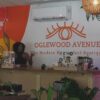During the early months of the COVID-19 pandemic in 2020, the mandatory shutdown was taking a toll on many companies, especially Black-owned businesses.
Unlike many of their clients, Malcolm Coley and Newdy Felton, co-founders of the Wilmington-based marketing company Influencers Lab, found they were able to pivot. The pair leveraged an online presence, e-commerce site and website to continue operations, and saw they need to help others do the same.
The duo planned to start a Facebook group for Black entrepreneurs before the pandemic, but with Black-owned businesses struggling to adapt and needing support, the pair decided to use the group as a place where Black business owners could network, exchange information and develop opportunities. Their Facebook group Spending Black Matters found immediate popularity.
“I’ll say in a matter of a month, we had about 10,000 people in our Facebook group,” Felton said. The group now boasts 33,000 members.
Coley and Felton attribute the group’s rapid growth in membership to a shared need for survival among Black entrepreneurs. Many Black-owned establishments depend heavily on support from Black consumers and networking within their community. The backing of Black consumers is vital for success, as they often lack support from other demographics.
Local Black businesses count on Black consumers
This is a key reason behind the creation of the Spending Black Matters Marketplace.
The Spending Black Matters marketplace is an annual free event that is open to the public. It showcases local Black-owned small businesses offering a range of professional services and products, including auto accessories, fashion, beauty, food, and wellness items. Participating vendors are also invited to attend discussions covering topics such as financing, financial management and effective marketing strategies for new business owners. This year’s expo took place at EastSide Charter School in Wilmington.
Katrina Watson, founder of A Whole New World cleaning company, said participating in community events such as the Spending Black Matters Marketplace is a valuable experience that allows her to better understand the community’s needs, wants and desires firsthand.
Watson said her three-year-old business is built on the connections she and fiance Kennedy Scott make at events such as Spending Black Matters Marketplace.
“Being us, African Americans, we’re not given the chances that most individuals have,” Scott said. “That’s why we have to come to events like this that allow all to come together and share ideas and make each other successful.”

Black-owned businesses face difficult market
Hearing from members of Spending Black Matters, Coley and Felton learned that while Black consumers spend at businesses regardless of ownership, Black-owned small businesses are not widely patronized by the general population.
“We as African Americans, we shop with every nationality. We shop (at Asian-owned businesses). We shop (at European-owned businesses.) We shop (at Hispanic-owned businesses). As soon as we get our money, it goes outside of our community,” Felton said.
Since the end of the shutdown, Black-owned enterprises have faced more competition, but they continue to be hindered by a lack of support from the broader community and a business environment that predominantly disadvantages people of color, as reported by the nonprofit Prosperity Now.
ROBOT V. ROBOT:BrandywineBOTS Robotics competes in regional robot competition ahead of world championship
SAFE HAVEN FOR KIDS:They go to school in a Wilmington high-rise. Soon, these kids hope to see a ‘safe haven’
HAPPY BLACK HISTORY MONTH!:Here’s what to know about how it started, the 2024 theme, more
Studies show that institutional factors have also contributed to the lack of support for Black business ownership. Long before the COVID-19 pandemic, many Black-owned firms struggled to survive and grow due to historical barriers to accessing credit, liquidity, and financing. Without these resources, many companies are unable to build the wealth and economic standing necessary to grow a successful business. The issue gained widespread attention during the nation’s response to George Floyd’s murder, prompting corporations to pledge billions in support of minority-owned businesses. Despite these commitments, Felton and Coley said many of the businesses they encounter still experience difficulties obtaining loans.

According to a survey by the Philadelphia Federal Reserve since the end of the shutdown, the lack of access to credit is a major obstacle impeding growth and sustainability due to declines in revenue for a majority of small businesses owned by people of color and women in the region. The Federal Reserve Bank of New York reports that the problem is especially pronounced for Black-owned companies.
Coley and Felton emphasized that for small Black-owned firms to prosper, society must embed the intended goals of diversity, equity and inclusion within its culture, rather than simply engaging in conversations and launching initiatives. They added that achieving this societal transformation is consequential, but until it becomes reality, success will need to begin within the community itself first.
“We are staying true to our North Star, which is to give access and create an ecosystem for black businesses… our businesses need be able to be in a position to generate and sustain and scale so that we could hire folks that look like us,” Coley said.
You can contact reporter Anitra Johnson at ajohnson@delawareonline.com.


